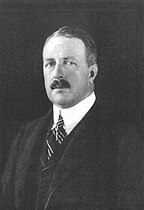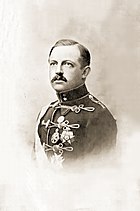Head of the Imperial House of Brazil
 From Wikipedia - Reading time: 10 min
From Wikipedia - Reading time: 10 min
| Head of the Imperial House of Brazil | |
|---|---|
| Chefe da Casa Imperial do Brasil | |
 Coat of Arms of the Head of the Imperial House of Brazil | |
since 15 July 2022 | |
| Style | His Imperial and Royal Highness Dom |
| Status | active |
| Member of | Brazilian imperial family |
| Residence | São Paulo, Brazil |
| Formation | 12 October 1822 |
| First holder | Pedro I of Brazil |
| Website | https://monarquia.org.br/ |
The Head of the Brazilian Imperial House (Portuguese: Chefe da Casa Imperial do Brasil[1]) is a title used by the leader of the Brazilian imperial family, currently the House of Orléans-Braganza, a descendant branch of the House of Braganza. The title of the head of the imperial house is "Emperor de jure". The current head of the imperial house is Prince Bertrand of Orléans-Braganza, who took over as head of the imperial house on July 15, 2022, after the death of his brother, Prince Luiz of Orléans-Braganza.[2]
After the death of the last emperor of Brazil, Pedro II, in 1891, in the wake of the proclamation of the Brazilian republic on November 15, 1889, and the revocation of all titles of nobility then existing, starting with the Brazilian Constitution of 1891, it serves to indicate the heir presumptive to the extinct imperial throne of Brazil.[3] The Brazilian monarchists affirm that, maintaining the logic established by the Brazilian Constitution of 1824, this title would respect the line of sovereignty of the jus sanguinis, being granted to the oldest male direct descendant of Emperor Pedro I of Brazil and, failing that, to the female one. If the holder of the title were a descendant of the Brazilian imperial family, as was Princess Isabel of Braganza, who married Prince Gaston of Orléans in 1864, the title would never be transmitted to her husband, this being the Head Consort of the Brazilian Imperial House.[4]
In the same way that happened with the Brazilian emperors when they were elevated to the throne, the first-born of the Head of the Brazilian Imperial House would receive the extinct title of Prince Imperial of Brazil, and his son the title of Prince of Grão-Pará.[5]
List of Heads of the Imperial House
[edit]Vassouras line
[edit]| Picture | Last name | Period |
|---|---|---|

|
Pedro I[6] | 12 October 1822 – 7 April 1831 |

|
Pedro II[7] | 7 April 1831 — 5 December 1891 |

|
Isabel of Braganza[8] | 5 December 1891 — 14 November 1921 |

|
Pedro Henrique of Orléans-Braganza[9] | 14 November 1921 — 5 July 1981 |

|
Luiz of Orléans-Braganza[10][11] | 5 July 1981 — 15 July 2022[12] |

|
Bertrand of Orléans-Braganza[13][14] | 15 July 2022 – current |
Dynastic question 1908
[edit]In 1908, Pedro de Alcântara, then Prince Imperial of Brazil in exile, wanted to marry Countess Elisabeth Dobržensky de Dobrženicz (1875–1951), whose family had belonged to the nobility of the kingdom of Bohemia.[15] The countess did not, however, belong to a reigning or formerly reigning dynasty, as both Orléans and Braganza traditions expected of brides. As Prince Pedro wanted to marry with his mother's blessing, he renounced his rights to the throne of Brazil at Cannes on 30 October 1908.[16] If the 1908 renunciation of Pedro de Alcântara was valid, his brother Luiz (and eventually, Pedro Henrique) became next in the line of succession after their mother.[17][18] Isabel's headship of the Brazilian Imperial House lasted until her death in 1921, when she is widely considered to have been succeeded by her grandson, Prince Pedro Henrique of Orléans-Braganza.[17][18] Pedro Henrique was the elder son of Prince Luiz, second child of Isabel and a veteran of World War I who had died in 1920 from an illness he contracted in the trenches.[18]
Prince Pedro de Alcântara did not dispute the validity of the renunciation.[19][20] Though he did not claim the headship of the Imperial House himself, in 1937 he did say in an interview that his renunciation "did not meet the requirements of Brazilian Law, there was no prior consultation with the nation, there was none of the necessary protocol that is required for acts of this nature and, furthermore, it was not a hereditary renunciation."[21]
The dynastic dispute over the Brazilian crown began after 1940 when Prince Pedro Gastão of Orléans-Braganza, eldest son of Pedro de Alcântara repudiated his father's renunciation and claimed the headship of the Brazilian Imperial House.[22][23]
Pedro Gastão actively campaigned in support of Brazil's 1993 referendum on restoration of the Brazilian monarchy, which would have postponed for subsequent decision by Parliament of which descendant of the former imperial family should occupy the throne if monarchy had been re-instated, but the option of restoration was defeated despite garnering approximately 17 million votes. After the death of Pedro Gastão in 2007, his eldest son Prince Pedro Carlos and younger children declared themselves republicans.[24] Several of Pedro Gastão's grandchildren also have dual citizenship.[25]
Vassouras branch
[edit]As the current Head of the Vassouras Branch Bertrand also has no children and has never been married, if Bertrand dies, the leadership will pass to his nephew Prince Rafael Antônio, who is the son of his late brother Antônio João of Orléans-Braganza and who holds the legitimate title of Prince Imperial of Brazil , as heir presumptive to his uncle. Antônio João, Rafael's father, had 4 children: Prince Pedro Luiz, Amélia Maria, Rafael Antônio and Maria Gabriela. Antônio's first son, Prince Pedro Luiz, died on Air France Flight 447,[26][27] and was fourth in the line of succession when he died,[28] Antonio's second daughter, Amélia Maria, was committed to resign her dynasty rights and the Brazilian princely title upon her marriage, although this is not legally allowed by Brazil's monarchical constitution without parliamentary approval.[29][30] Antonio's last daughter, Maria Gabriela, is third in line to the throne and head the Imperial House.
Currently, Eleonora de Ligne is fourth in line to head the Imperial House of Brazil, she married the head of the House of Ligne of Belgium, Michel, Prince of Ligne, with whom she had two children: Princess Alix and Henri Antoine, Crown Prince of Ligne.
Petropolis branch
[edit]For others, the person who succeeded by right to Isabel Leopoldina at the head of the imperial house was her son Pedro de Alcântara, Prince of Grão-Pará, considering the instrument of resignation signed by him null and void. After the death of Pedro de Alcântara (1940), his son Pedro Gastão[31] (until 2007) and his grandson Pedro Carlos of Orleans-Braganza[32] would have risen successively.[33]
References
[edit]- ^ "No pior momento da pandemia, Chefe da Casa Imperial do Brasil divulga mensagem". Jornal Mundo Lusíada (in Brazilian Portuguese). 2021-04-05. Retrieved 2023-02-02.
- ^ Freire, Quintino Gomes (2020-12-26). "Mensagem de Natal de 2020 do Chefe da Casa Imperial do Brasil". Diário do Rio de Janeiro (in Brazilian Portuguese). Retrieved 2023-02-02.
- ^ "Presidência da República Casa Civil Subchefia para Assuntos Jurídicos". www.planalto.gov.br. Retrieved 2023-02-02.
- ^ "Constituicao24". www.planalto.gov.br. Retrieved 2023-02-02.
- ^ Vasconcellos, barão de; Smith de Vasconcellos, barão (1918). Archivo nobiliarchico brasileiro. Robarts - University of Toronto. Lausanne : Imprimerie La Concorde.
- ^ "Pedro I: Emperor's embalmed heart arrives in Brazil". BBC News. 2022-08-22. Retrieved 2023-02-02.
- ^ "Today is the Day: Dom Pedro II, the last emperor of Brazil". Agência Brasil. 2021-12-05. Retrieved 2023-02-02.
- ^ "Princesa Isabel » Monarquia". monarquia.org.br. Retrieved 2023-02-02.
- ^ "D. Pedro Henrique » Monarquia". monarquia.org.br. Retrieved 2023-02-02.
- ^ "Dom Luiz » Monarquia". monarquia.org.br. Retrieved 2023-02-02.
- ^ "Senado Federal - Programa e-Cidadania - Ideia Legislativa". Senado Federal - Programa e-Cidadania (in Portuguese). Retrieved 2023-02-02.
- ^ Poder360 (2022-07-15). "Morre Luiz de Orleans e Bragança, bisneto da princesa Isabel". Poder360 (in Brazilian Portuguese). Retrieved 2023-02-02.
{{cite web}}: CS1 maint: numeric names: authors list (link) - ^ Moreira, Éric (23 July 2022). "Trineto de Dom Pedro II: quem é o atual chefe da Casa Imperial brasileira?". Aventuras na História (in Brazilian Portuguese). Retrieved 2023-02-02.
- ^ Costa, Anna Gabriela. "Veja quem são os membros da Família Imperial Brasileira ainda vivos". CNN Brasil (in Brazilian Portuguese). Retrieved 2023-02-02.
- ^ Enache, Nicolas. La Descendance de Marie-Therese de Habsburg. ICC, Paris, 1996. pp. 71, 80. (French). ISBN 2-908003-04-X
- ^ Montgomery-Massingberd, Hugh. "Burke's Royal Families of the World: Volume I Europe & Latin America, 1977, pp. 43, 48, 50–51. ISBN 0-85011-023-8
- ^ a b BARSA (1992) (in Portuguese). Braganza, vol. 4, p. 210
- ^ a b c MALATIAN, Teresa (2007) (in Portuguese). In: BrHistória issue 4, p. 35
- ^ SANTOS (1988: 76)
- ^ SILVA (1994: 228–229)
- ^ VILLON, Victor (2008). Elisabeth Dobrzensky von Dobrzenicz "Empress of Brazil". In: Royalty Digest Quarterly, 3, p. 33.
- ^ CERQUEIRA, Bruno da Silva A. (2007) (in Portuguese). In: BrHistória issue 4, p. 58
- ^ SANTOS (1988: 197)
- ^ GUTIÉRREZ, Bernardo (2008) (in Spanish). La familia real brasileña defiende los nuevos ideales. In: Público.es, 2008-01-09.
- ^ Revista Caras. (March 28, 2013) Paola de Orleans e Bragança.
- ^ "G1 > Mundo - NOTÍCIAS - Corpo de príncipe brasileiro que estava no voo 447 é enterrado no RJ". g1.globo.com. Retrieved 2023-02-02.
- ^ redacaoterra. "voo af 447 - lista das vítimas - ficha - Pedro Luis de Orleans e Bragança". Terra (in Brazilian Portuguese). Retrieved 2023-02-02.
- ^ "Dom Pedro Luiz » Monarquia". monarquia.org.br. Retrieved 2023-02-02.
- ^ "Fullscreen Page". Antigase (in Portuguese). Retrieved 2023-02-02.
- ^ "O belíssimo e emocionante casamento da princesa dona Amélia de Orléans e Bragança e Alexander James Spearman | Hildegard Angel" (in Brazilian Portuguese). 10 September 2014. Retrieved 2023-02-02.
- ^ "Morre Pedro Gastão de Orleans e Bragança". www2.senado.leg.br. Retrieved 2023-02-02.
- ^ Minas, Tribuna de (2020-09-17). "Dom Pedro Carlos de Orleans e Bragança e Bourbon (bisneto da princesa Isabel) e a mulher Patrícia". Tribuna de Minas (in Brazilian Portuguese). Retrieved 2023-02-02.
- ^ Bernardo Gutiérrez, "La familia real brasileña defiende los nuevos ideales", Príncipes Republicanos (09/01/2008)
 KSF
KSF



